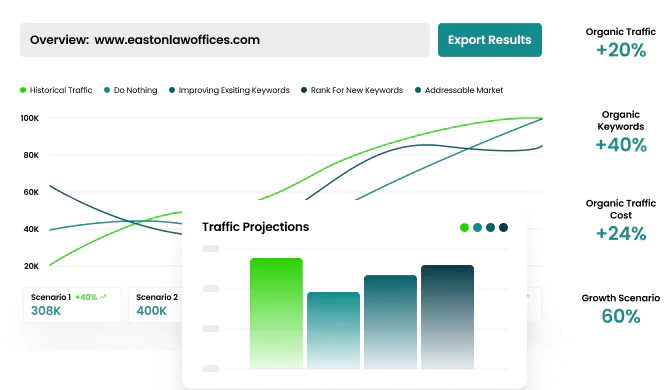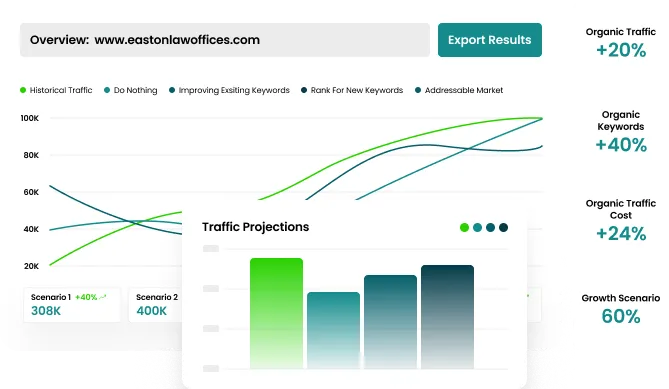Small Law Firm Marketing – A Complete Guide

Every law firm exists for one primary purpose: to deliver justice to clients who have found themself stuck in challenging legal situations. To achieve this, law firms rely on a continuous flow of new clients to keep their business model afloat. Marketing is critical for law firms to generate new leads and continue operating, especially in today’s digital age. Even the best law firms will fail to thrive without an effective marketing strategy.
How to Market Your Small Law Firm to Potential Clients
As a small law firm, you may think you do not have the budget to compete with larger firms in marketing. This is a familiar feeling among small businesses that is not always accurate. While it is true that you can execute more marketing programs when you have a larger budget, that doesn’t always mean the larger budget wins.
The key to successful marketing for small law firms is knowing where to put your limited dollars to get the most results. By having a stronger understanding of your target audience and what marketing channels they use most, you can put your money toward the programs that will be most successful in raising awareness of your legal services and bringing in new clients.
Here are a few tips for marketing your small law firm.
Create a Trustworthy Brand
The first step in marketing your small law firm is to create a trustworthy brand. Your potential clients need to feel confident that they can trust you with their legal needs. Creating a robust and positive brand image will help to build this trust and confidence. You can do this by ensuring your firm’s website is professional and up to date, using print and online marketing materials that are consistent in look and message, and by actively engaging with potential clients on social media. A trustworthy message entails more than just saying you are the best at what you do. Your potential clients need to see that you are an authority in your field through your content, design, and interactions.

Some key components of a trustworthy brand include:
- A strong visual identity that is consistent across all marketing materials
- Well-written and informative content that educates potential clients about the value you are already offering to clients who are facing situations that are similar to theirs
- Active social media presence that demonstrates your knowledge and expertise
Focus on Your Clients’ Needs
When marketing your small law firm, prioritizing the needs of your clients is essential. Your marketing should focus on solving the problems your potential clients face. You are going to be more likely to capture their attention and interest by addressing their needs directly. Your website, social media posts, and other marketing materials should all be focused on providing helpful information that will help your target audience. For example, if you specialize in family law, your blog posts could discuss everyday questions about divorce or child custody. This ensures prospective clients can easily see that you’re an expert in the area they need help with and that you understand their specific situation.
The best way to understand what your prospective clients need includes:
- Researching your target audience and understanding their specific pain points
- Creating customer personas to help you better understand your target clients
- Developing buyer journey maps to visualize the steps your clients take from first becoming aware of their need for legal assistance to ultimately hiring a law firm
- Conducting regular surveys of your current clients to get feedback on their experience and what they think you could improve
- Executing your own focus groups or interviews with prospective clients to get even more insight into their needs
Invest Your Marketing Budget Wisely
As a small law firm, you need to be strategic with your marketing budget. You can’t afford to waste money on marketing programs that don’t produce results. Instead, invest your budget in the programs that will reach your target audience and generate leads. Some effective marketing channels for law firms include online advertising, content marketing, and public relations. You should also consider attending industry events and hosting your own events to attract potential clients and referral sources.

A healthy marketing budget includes the following features:
- Allocates the majority of funds toward online marketing efforts that can be easily measured for return on investment
- Invests in high-quality content that can help to establish your firm as an authority in your practice area
- Prioritizes activities that can generate the most leads, such as attending industry events or hosting your own events
Outsource Time Consuming Marketing Efforts
One way to free up time and resources to focus on marketing your small law firm is to outsource certain marketing tasks. This can be an effective way to get more done without having to hire additional staff. Several marketing tasks can be outsourced, such as social media management, content creation, and email marketing. You can also outsource help with administrative tasks, such as scheduling appointments and managing your contact list. This lets you focus your time and energy on running your law firm while not sacrificing any progress on your marketing efforts.

When working with an agency to outsource your marketing, be sure to:
- Define your goals and objectives upfront so they can tailor their services to your specific needs
- Get a detailed proposal that outlines the deliverables and cost for each project
- Review their portfolio to ensure they have experience working with law firms
Study Your Marketing Analytics
Finally, it is important to study your marketing analytics on a regular basis. This can help you to understand what is working and what’s not. By tracking your website traffic, social media engagement, and other metrics, you can fine-tune your marketing strategy to focus on the most effective channels. Specific numbers such as leads generated, conversion rates, and ROI will give you a clear picture of which marketing programs are worth repeating and allocating your budget towards.

Marketing Terms Small Law Firms Should Know
When it comes to marketing your small law firm, there are a number of terms you should become familiar with. These terms can help you to understand the different aspects of marketing and how they can be used to benefit your business.
Marketing Leads
A marketing lead is a potential client or referral source that your law firm can contact. These leads can be generated through various marketing channels, such as your website, social media, or online advertising. Typically, this is an individual who was so compelled by your content that they filled out a form to either access more information or schedule a consultation. These are considered a “digital hand-raise” and are incredibly valuable because they have already shown an interest in your services. Follow up with these leads quickly and efficiently to book appointments and grow your client base.

It’s important to define what a qualified marketing lead looks like to your law firm. The criteria for a qualified marketing lead could include:
- The type of legal services they need
- Where they are located
- Their budget for legal services
- Their timeline for hiring a lawyer
- Whether a current client has referred them
By defining your ideal marketing lead, you can focus your efforts on generating the most qualified leads that are more likely to turn into paying clients.
Landing Page
A landing page is a specific webpage hosted on your website but exists outside your normal website navigation. It is designed to encourage visitors into leads by taking a particular action, such as providing their contact information or scheduling a consultation. Typically, one landing page exists for one specific marketing campaign or offer. For example, if you are running a Google Ads campaign to attract new clients by providing a free guide, you would send visitors to a landing page specifically designed for that offer. The page would include information about the guide and a form for visitors to fill out and submit. Once the submission occurs, you as a law firm now have their contact information and can follow up accordingly.

A strong high-converting landing page contains:
- A clear and concise headline that outlines what the visitor will get by taking action
- A form for visitors to fill out with their contact information
- An image or video that further speaks to the offer
- Bullet points that highlight the benefits of taking action
- A CTA (call to action) that is clear and visible
Conversion Rate
Your conversion rate is determined by the percentage of visitors to your website or landing page who take the desired action. For example, if you have a landing page that offers a free guide in exchange for an email address and 100 people visit the page, but only 10 people fill out the form, your conversion rate would be 10%. This number is important to track because it can help you to understand how effective your marketing efforts are in terms of generating leads. On the other hand, if you have a low conversion rate, it could indicate several problems, such as poor website design or an unappealing offer.

A strong conversion rate is often tied to digital marketing efforts that:
- Are targeted toward the right audience
- Have a strong value proposition
- Are mobile-friendly
- Have a clear and concise CTA
- Have well-designed visual imagery that captures natural attention
Search Engine Optimization (SEO)
Search engine optimization is the digital search strategy of optimizing your website and its content to rank higher in search engine results pages (SERPs). This is important because it will help you to reach more potential clients who are actively searching for services but are not explicitly looking up your law firm. By ranking higher in search results, you can increase the number of people coming to your website that need your legal services.

Components of a strong SEO strategy for law firms include:
- Researching and targeting the right keywords
- Creating high-quality content that is relevant to those keywords
- Building links from other websites back to your own
- Optimizing your website for mobile devices
- Making sure your website is fast and easy to use
Pay-Per-Click (PPC)
Pay-per-click advertising is online advertising that allows you to bid on specific keywords to have your ads placed on search engine results pages. When someone searches for one of the keywords you are bidding on and your ad is clicked, you will be charged a fee for that click. This is a great way to quickly generate leads that you would not have obtained organically through SEO. This option allows you to bypass the process of waiting for your website to rank higher in search results and instead pay to have your ad placed at the top only to your pre-selected target audience.

The best PPC ads that generate leads for law firms:
- Are specific and relevant to the keywords they’re targeting
- Have a strong headline that speaks to the needs of the searcher
- Include a call to action that is clear and easy to follow
- Are placed on websites that are frequented by your target audience
- Are well-designed and visually appealing
Call to Action (CTA)
A call to action is a specific piece of text or button on your website or landing page that encourages visitors to take a desired action. For example, a CTA could be a button that says, “Download Now” or “Schedule a Consultation.” This is an important element of lead generation because it helps to guide visitors towards taking the action that you want them to take. Without a CTA, visitors may come to your website and simply leave without taking any action. This defeats the purpose of lead generation and can hurt your conversion rate

A strong CTA should:
- Be clear and concise
- Use persuasive language
- Encourage the desired action
- Be placed in a visible location
- Be mobile-friendly
Return on Investment (ROI)
Your return on investment is the amount of money you make from your marketing efforts divided by the amount of money you spend on those efforts. For example, if you spend $1,000 on a marketing campaign and it generates $2,000 in new business, you can make a clear tie between your marketing efforts and the new revenue they generate. This number is important to track because it shows you whether your marketing campaigns are profitable and worth your time and money. If you do not see a positive ROI, you may need to consider making changes to your campaigns or hiring an outside marketing firm that can help you to target your audience better.

Some of the strongest ROI marketing numbers to assess for your law firm’s campaigns include:
- The number of new leads generated
- The number of new clients acquired
- The amount of money spent on marketing
- The amount of money made from new clients
- The percentage of leads converted to clients
- The cost per lead
By tracking your ROI, you can make well-informed decisions about where to allocate your marketing budget and what changes need to be made to see a higher return on investment.
Techniques to Market Your Small Law Firm
There are many different techniques you can use to market your small law firm. The most important thing is to find the techniques that work best for you and that you are most comfortable with. The following are some popular techniques you may want to consider using.
Set a Marketing Budget
The first step to marketing your law firm is to set a budget. Having a budget can help ensure you are not spending more money than you can afford on marketing. Also, your budget can help you track your ROI more effectively. When setting your budget, be sure to consider the cost of any materials or services you will need to purchase, such as website design or pay-per-click advertising.
You should also consider the cost of your time if you plan on doing any of the marketing yourself. Some key considerations for setting your marketing budget include the size of your law firm, the geographic area you serve, the type of clients you want to attract, and the amount of competition you face.
A marketing budget should:
- Be based on your overall business goals
- Be reviewed and updated regularly
- Include the cost of materials, services, and your time
- Be affordable and realistic
Develop a Marketing Strategy
Once you have set your budget, it’s time to develop a marketing strategy. This should be a detailed plan outlining your actions to achieve your marketing goals. Your strategy should be designed to reach your target audience and should consider different methods you will use to generate leads, such as SEO, pay-per-click advertising, social media marketing, and content marketing. Be sure to track your progress so that you can adjust your strategy as needed.
A classic marketing strategy includes the following elements:
- Define your target market
- Set marketing goals
- Determine your budget
- Choose your marketing channels
- Develop your messaging
- Create a schedule and content calendar
- Measure your results
- Repeat and adjust as needed
Build an SEO Optimized Law Firm Website
Your law firm website is one of your most important marketing tools. It should be designed to attract your target audience and should be optimized for search engines so that potential clients can easily find it when they are searching for legal services online. When building your website, be sure to include keyword-rich content, strong calls to action, and easy-to-use contact forms. You should also make sure your website is mobile-friendly so potential clients can easily view it on their smartphones and tablets. A site properly optimized for SEO is a gift that keeps on giving, as it can continue to generate leads long after you build it.

When starting from scratch, we recommend following these SEO tips for law firm websites:
- Do your research. Keyword research is essential for SEO success. Use tools like Google AdWords Keyword Planner and Google Trends to determine which keywords are most popular with your target audience.
- Use keyword-rich titles. The title of your website should include your target keywords. This helps search engines understand your website and makes it more likely that potential clients will find it when searching for legal services online.
- Create keyword-rich content. In addition to using keywords in your titles, you should also use them throughout your website content. Be sure to use them in a way that sounds natural and avoid keyword stuffing, which is when keywords are used excessively and can make your content difficult to read.
- Optimize your images. Whenever you upload an image to your website, include keywords in the file name and fill out the alternate text field with a brief description of the image. This helps search engines index your images and makes them more likely to appear in image search results.
- Build backlinks. Backlinks are links from other websites to your website. They help improve your website’s search engine ranking and can generate leads from other sources. You can build backlinks by guest blogging, submitting articles to directories, and listing your website in directories and business listings.
Register for Free Online Profiles
There are many online directories and profiles that you can register for free. These websites provide valuable exposure for your law firm and can help you to generate leads. Be sure to include your law firm name, address, phone number, and website URL in your profile so potential clients can easily find you. You should also take the time to write a brief description of your law firm and the services you offer. This extends your digital reach and allows clients to find you even if they are not actively searching for your name or if your competitor’s name comes up first in the search results.

Some of the best online directories and profiles for law firms include:
- Google My Business
- Bing Places for Business
- Avvo
- com
- Justia
- Yelp
Consistent Social Media Presence
Social media is a powerful tool that you can use to market your small law firm. It allows you to personally connect with potential clients, build relationships, and generate leads. Be sure to create consistent social media posts relevant to your target audience and that offer value. When a prospective client sees a constant flow of valuable content from your law firm in their newsfeed, it sets the tone that you’re an authority in your field and are helping people similar to them daily. On the other hand, social media accounts that post sparingly and inconsistently are likely to be forgotten or not viewed as favorably.

Some tips for using social media to market your small law firm include:
- Find out where your target audience hangs out online and make sure you have a presence on those platforms.
- Post relevant and valuable content frequently.
- Engage with your followers by responding to comments and questions.
- Use social media ads to target your ideal client.
- Run social media contests and giveaways to increase engagement and generate leads.
Showcase Positive Online Reviews
Potential clients will often research your law firm online before they decide to contact you. They will read your website content, social media posts, and online reviews to get a sense of who you are and what you’re like to work with. That’s why it’s important to showcase positive online reviews on your website and social media sites. You can also encourage happy clients to leave reviews by sending them a link after their case has been resolved. These are some of the most powerful marketing messages, as clients value third-party opinions who don’t have as much of a bias or financial interest as a law firm marketing their own services.

To generate more online reviews, you can:
- Send a follow-up email or text message to clients after their case has been resolved, asking them to leave a review.
- Include links to your Google, Yelp, and Avvo profiles on your website and in your email signature.
- Respond to all reviews, both positive and negative.
- Showcase your positive reviews on your website and social media sites.
When someone agrees to provide a review, they are doing you a favor. Be sure to express your gratitude, whether they leave the review online or offline.
Start a Blog That Offers Helpful Information
One of the best ways to market your small law firm is to start a blog and offer helpful information that potential clients are searching for online. Blogs are powerful, short-form content pieces that can help you to attract new visitors to your website and generate leads. Sometimes the average person doesn’t have time to read a longer article or e-book, but they will often read a blog post if it’s interesting and relevant to them. Or sometimes, a short-form blog inspires them to want to learn more, leading them to a longer article or e-book that they would not have accessed if not for the initial blog. This is some of the value that investing in a blog strategy can offer your small law firm.
Some creative ideas for blog topics include:
- How to choose the right lawyer for your case
- The top five questions to ask a personal injury lawyer
- What to do if you’ve been in a car accident
- How to know if you have a Workers’ Compensation case
- The top three things to look for in a divorce lawyer
Remember, when writing your blog posts, to focus on providing value and helpful information rather than selling your services. If you can establish yourself as an authority in your field without being aggressive or salesy, potential clients will be more likely to contact you when they’re ready to hire a lawyer as they are less intimidated and will see you as a more trustworthy legal leader rather than a salesperson.
Analyze and Adjust Your Marketing Efforts Accordingly
The most important thing you can do when marketing your small law firm is to track your results and analyze the data. Operating any marketing campaigns and judging their success on “feeling” alone is a recipe for disaster. You need to track your website traffic, leads, and conversions so that you can justify each marketing expense and know which campaigns are working. Then you can adjust your marketing efforts accordingly to make the most of your budget and generate the best results for your law firm.

Some of the most important data points to track include:
- Website traffic (overall and from specific campaigns/channels)
- Leads generated (overall and from specific campaigns/channels)
- Conversions/cases won (overall and from specific campaigns/channels)
- Cost per lead/conversion
By analyzing this data, you can see which marketing campaigns are working and which ones are not. Then you can either adjust those campaigns or cut them completely to save money.
Small Law Firm Marketing FAQs
How Do You Market a Small Law Firm?
There are a number of ways to market a small law firm. Traditional methods such as print advertising, yellow pages, and direct mail can still be effective, but it is important to also have a strong online presence. A website is essential, and social media can be a great way to connect with potential clients. It is also important to make sure that your firm is listed in online directories. You also want to be sure you have a strong SEO strategy to ensure potential clients can find you when they search for legal services online.
How Can I Market My Law Firm Myself?
A: If you are looking to save on marketing costs, there are many different ways you can market your law firm yourself. Creating a strong online presence is essential, and it can be done relatively cheaply. Social media is a great marketing initiative to connect with potential clients, and there are several free online directories you can list your firm in.
It is also recommended to ensure your website is optimized for search engines, so potential clients in need can easily find you when they search for legal services online. Sometimes you can take on one or two of these tasks independently while still contracting out other marketing tasks to a professional that you might not be as skilled in.
How Much Should a Law Firm Spend on Advertising?
There is no definitive answer to this question, as the amount that a law firm spends on advertising will vary depending on a variety of factors, such as the size of the firm, the location, the type of law that is practiced, and the target market. However, as a rule of thumb, spending around 10% of your gross revenue on marketing and advertising is advisable. This can help ensure that you have a healthy marketing budget to work with – without breaking the bank. If you feel that percentage is aggressive and unrealistic for the current status of your firm, it’s even more of a reason to connect with a marketing agency that can assess your needs and suggest how to leverage the limited dollars you have to make the largest impact possible.
What Are Some Creative Marketing Ideas for Law Firms?
Sponsoring community events is a great way to get your name out there and show that you’re invested in the well-being of your community. You can leverage some of the marketing efforts discussed to promote the event and drive attendance. You can also offer free consultations, host educational seminars, or start a blog to share your legal knowledge. Whatever marketing strategy you choose, make sure you’re consistent and have a clear plan in place.
How Do I Get More Clients for My Small Firm?
Start by evaluating your current marketing efforts and make sure you are targeting the right audience. Any previous clients or referral sources can be great potential leads, so make sure to stay in touch. You can also join relevant online communities and participate in discussions or sponsor local events. Keep in mind that it takes time to build up a client base, so don’t get discouraged if you don’t see results immediately. Each marketing activity you execute is a learning opportunity that can help you better understand what works for your firm and guide your future marketing efforts.
Talk With Marketing Professionals to Grow Your Small Law Firm Today
As a small law firm, you may not have the internal resources to invest in marketing. However, this doesn’t mean you can’t or shouldn’t be marketing your firm. There are many ways to get help with your marketing, from hiring a freelance marketer to working with a marketing agency.
If you are not sure where to start, connect with the digital marketing experts of RizeUp Media. We are a full-service marketing agency that specializes in helping law firms grow. We deeply understand the legal industry and have helped countless firms increase their leads, grow their practice, and achieve their business goals. We are not intimidated by the big players in your market, and we are ready to help you level the playing field for your small law firm.
Contact us today to learn more about our services and how we can help you grow your small law firm by leveraging the power of digital marketing.
Our Latest Blog Posts
Law Firm Marketing: A Comprehensive Strategy Guide for Lawyers
How an Effective Marketing Strategy Can Help Your Law Firm Grow In…
Artificial Intelligence for Lawyers – 9 Ways AI Can Boost Law Firm [...]
As an attorney competing in the modern marketplace, you need to be…
Personal Injury Lawyer SEO – The Ultimate Guide to Drive More Traffic [...]
In the fiercely competitive landscape of legal services, standing out with a…
Testimonials
Here's What Our Clients Are Saying




Travis and his team are responsive, creative, and attentive. They are attuned to the specific needs of my business. Highly recommend them!
Dorie Rogers


We have been using large nation-wide firms for marketing. And as usual, initial good service that tails off and gets worse. When Bo decided to open his own firm, I trusted that his attention to detail and personal service would be great, and I was right. RizeUp has…
Juan Armenta


RizeUp Media has taken an active, turnkey approach to our digital marketing. They provide a strategic, integrated and cost-effective marketing plan that is tailored to our short- and long-term revenue growth objectives. I have worked with Bo Bryant & Travis Hoechlin for several years now and their expertise,…
Jason Martinez


RizeUp Media delivers! I have used other marketing services, but none compare to the outstanding results RizeUp delivers. The company is professional, friendly, helpful and deliver where other marketing services fall short. Highly recommended!!
Michelanne Hrubic


RizeUp has been terrific. Their team of truly experienced experts and professionals worked very hard to put our business first.
Andrew Chivinski


We have tried three different web development companies and RizeUp is really the strategic partner we were looking for. They went beyond just putting up a website. They focused on what made our firm different and our goals regarding which clients to reach. I truly feel that we…
Drummond McCunn


I have used them for several months, after switching from Findlaw. They rock.
Raymond Hane


I recently started working with RizeUp Media for my law firm’s website and SEO work. I am so impressed with this company and highly recommend them.
Bill Cumming


We switched to RizeUp early in the year, and the new web site launched 3 months ago. We've already seen a solid uptake in calls from the web site, and a higher number of potential clients. Very solid work, and the people are friendly, responsive, professional, and great…
Matt Bangerter


We switched providers to RizeUp Media a few months ago. I was tired of having to worry about our website and the SEO work that is required to keep up with all the changes in Google Search. My prior provider was not responsive and barely did anything. RizeUp…






